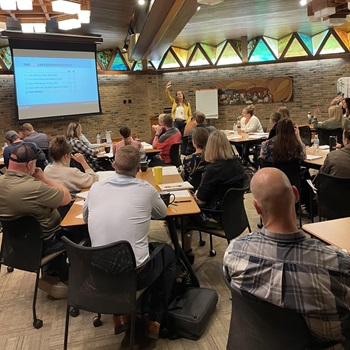I’ve been presenting on effective communication for 30 years now, and it has consistently made me check myself as well as my results. Like anyone, I can go on “autopilot” and lose focus on being intentional with my messages. When this happens, I revert to saying things the way it’s most comfortable for me to communicate because that is easiest and most practiced. But it is not always effective; others understand me less. I find the greatest opportunity for miscommunication exists when I don’t take the time to consider who my audience is and what works best for them.
I operate with the belief that “the meaning of your communication is the response you get,” and if you embrace this philosophy, it means the responsibility for your communication is with the speaker 100%. It is up to you to find what works best for the other person, and flex to that. When people are understood, they are open, curious, willing to listen, and forgiving. This is where we build bridges instead of walls. Read below for simple suggestions on how to build these bridges every day.
1. Find the common ground. Ask yourself, “Who is in front of me? What do I have in common with this person/audience? What goals do we share? How can we help each other?” Recognizing the shared goal, benefit, or problem to solve will help you establish rapport and build trust with the other person/people. Let your common ground drive you as you collaborate and work together.
2. Speaking of trust, it’s important to recognize that people assign trust differently. Some people assume trust from the moment they meet you. When you first begin interacting with them, they trust you 100%. As time goes on, that percentage of trust may decrease depending on your actions and behaviors. Other people believe trust needs to be earned. These people believe you begin at 0% and trust is earned as time goes on and your actions align with your words – words alone are not enough. If you usually assume trust, you may misread people’s preferences and become offended or try too hard if the other person doesn’t open up quickly. In fact, you may need to work on talking less and doing exactly what you promise to gain trust in the relationship. Conversely, if you are one to hesitate in relationships, you may need to give others the benefit of the doubt if you typically use logic and a proven track record when entering first time situations with those who assume trust.
Tune in to tomorrow’s blog for more communication practices!
Categories: Sue's Daily Blog


